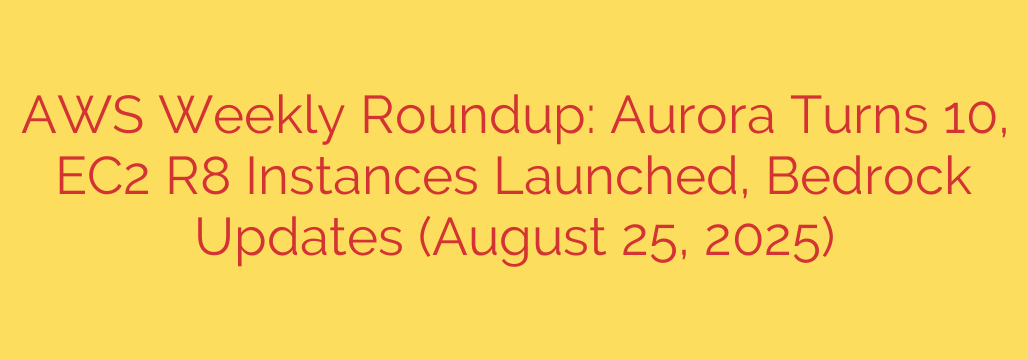
Key AWS Updates: New EC2 R8g Instances, Major Bedrock AI Enhancements, and a Look at Aurora at 10
In the fast-paced world of cloud computing, staying on top of the latest advancements is crucial for optimizing performance, managing costs, and unlocking new capabilities. Amazon Web Services (AWS) continues its relentless pace of innovation, and recent announcements bring significant enhancements across compute, database, and artificial intelligence services.
Let’s dive into the most important updates you need to know about, including the launch of next-generation EC2 instances, powerful new features for Amazon Bedrock, and a major milestone for the popular Aurora database service.
Unleashing Next-Gen Performance: Introducing EC2 R8g Instances
For workloads that demand high memory and processing power, AWS has officially launched its new generation of memory-optimized instances: the EC2 R8g instances. These are a game-changer for businesses running large-scale databases, in-memory caches, and real-time big data analytics.
What makes them so powerful? The R8g instances are powered by the new, custom-designed AWS Graviton4 processors. Built on the AWS Nitro System, these instances deliver a significant boost in performance and price-performance compared to previous generations. Key benefits include:
- Superior Performance: Designed for memory-intensive applications like Redis, Memcached, and relational databases that require large datasets in memory for low-latency access.
- Enhanced Price-Performance: The efficiency of the Graviton4 processors means you can get more computational power for your money, helping to lower your overall cloud spend.
- Increased Memory and vCPUs: The R8g instances offer larger instance sizes, providing more vCPU and memory resources to handle even the most demanding enterprise workloads.
Actionable Tip: If your workloads are currently running on previous-generation R-series instances (like R6g or R7g), now is the time to plan and test a migration to R8g. The potential for substantial cost savings and performance gains makes this a compelling and necessary upgrade to evaluate.
Generative AI on AWS Gets a Major Boost with Bedrock Updates
Amazon Bedrock has quickly become a cornerstone for developers building generative AI applications, providing a streamlined way to access a wide range of powerful foundation models (FMs). Recent updates have made the service even more capable, secure, and user-friendly.
The latest enhancements focus on expanding model choice and strengthening governance, allowing teams to build more sophisticated and responsible AI solutions. Notable updates include:
- Expanded Access to Leading Models: AWS is continually adding the latest and most advanced models from leading AI companies to the Bedrock platform. This ensures developers have access to the best tools for their specific use case, whether it’s text generation, summarization, or complex reasoning.
- Improved Fine-Tuning Capabilities: The ability to fine-tune foundation models with your own data is critical for creating differentiated AI applications. AWS has rolled out improvements that make this process more efficient and effective, allowing for greater model accuracy and relevance.
Crucial Security Tip: For any organization building with generative AI, responsible implementation is non-negotiable. Leverage Guardrails for Amazon Bedrock to enforce safety policies. This feature allows you to implement critical safeguards by defining denied topics, filtering harmful content, and redacting sensitive personally identifiable information (PII). Properly configuring guardrails is an essential step in deploying AI applications that are both powerful and safe.
Amazon Aurora Celebrates a Decade of Database Innovation
It’s hard to believe it’s been ten years since Amazon Aurora was first introduced, but this powerful service has fundamentally changed the landscape of relational databases in the cloud. Initially launched as a MySQL-compatible database, Aurora has since added PostgreSQL compatibility and a host of features that deliver unparalleled performance, scalability, and availability.
Over the past decade, Aurora has become the go-to choice for mission-critical applications by offering:
- Performance at Scale: Aurora provides the performance and availability of high-end commercial databases at a fraction of the cost, handling demanding transaction rates with ease.
- High Availability and Durability: With its unique architecture that replicates data across multiple Availability Zones, Aurora is designed for 99.99% availability and fault tolerance.
- Continuous Innovation: From the introduction of Aurora Serverless to features like I/O-Optimized storage, AWS has consistently evolved the service to meet modern application needs.
This ten-year milestone serves as a testament to Aurora’s reliability and its central role in the cloud ecosystem.
Actionable Tip: If you are an existing Aurora user, this is an excellent opportunity to review your cluster configurations. Ensure you are using features like Aurora I/O-Optimized storage for high-throughput workloads and consider Aurora Serverless v2 for applications with unpredictable traffic patterns to optimize both cost and performance.
Source: https://aws.amazon.com/blogs/aws/aws-weekly-roundup-amazon-aurora-10th-anniversary-amazon-ec2-r8-instances-amazon-bedrock-and-more-august-25-2025/








